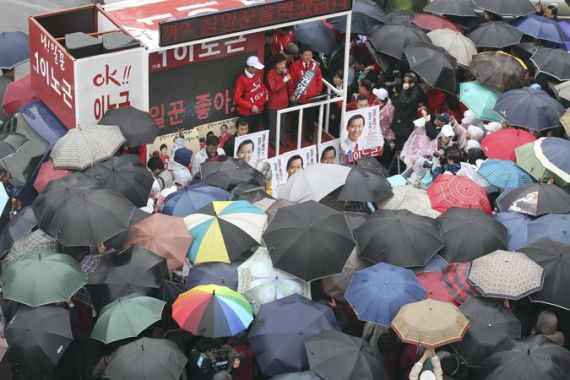South Korea votes in closely contested poll
Ruling conservatives face stiff challenge in parliamentary ballot expected to set tone for December presidential vote.

Voters in South Korea are going to the polls on Wednesday in closely contested parliamentary elections that are seen as a key test of sentiment ahead of a presidential vote in December.
Voting began early on Wednesday across the country under overcast skies and scattered rain for a poll being fought mostly on economic issues.
President Lee Myung-Bak’s ruling conservative New Frontier Party (NFP) is struggling to preserve its parliamentary majority in the election, a prelude to what it hopes will be a second successive presidential victory.
Opinion polls are banned this week but experts predict a virtual dead heat between the NFP and the main opposition centre-left Democratic United Party (DUP), with each side winning 130-135 seats in the 300-member National Assembly.
The NFP had 165 seats in the outgoing parliament against 89 for the DUP.
The election is seen as a test for presidential hopefuls, particularly as it will be the first time for two decades that presidential and parliamentary elections fall in the same year.
Hopefuls include NFP leader Park Geun-Hye – Lee cannot stand for a second term – and her potential opposition rival Moon Jae-In.
While North Korea’s rocket launch planned for the coming days is the sole focus of international attention on the Korean peninsula, it has barely figured in the election campaign in the south, where tensions with the country’s Communist neighbour are almost a constant state of affairs.
Economic issues such as rising prices, high education and housing costs, job difficulties, a widening income gap and a weak welfare system have instead been the key topics in the campaign.
High inflation
The opposition has attacked the government for high inflation and a widening income gap.
“It’s time to judge the current regime!” opposition leader Han Myeong-Sook said in her final appeal to voters on Tuesday in Seoul, clad in her party’s signature yellow jacket.
“Allow us to end the Lee Myung-Bak administration and give you spring,” she said.
For its part, the ruling party has ditched its old name of the Grand National Party and moved to the left in a bid to try to shake off its image as being for the rich, with promises such as improving state welfare programmes.
Voter turnout is being closely watched, with a high showing, especially among young voters, seen as benefiting the centre-left opposition.
Another major issue is a free trade agreement with the United States, which the NFP has backed but the DUP has vowed to renegotiate.
This has led the ruling party to depict the DUP as socially divisive and bent on undermining a decades-old security alliance with the United States.
The national assembly is made up of 246 directly contested seats and 56 proportional representation seats to be allocated to parties according to the total numbers of votes they receive nationwide.